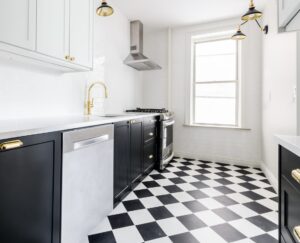Durable Kitchen Flooring Options to Consider for Your Remodel
Guest Post by John Guevara

Photo by Chastity Cortijo on Unsplash
Remodelling your kitchen is one of the most challenging activities you can engage in.
Unlike a living room or a bedroom, which contain a few in-built components or complex wiring, kitchens usually have a lot to consider.
These considerations include electricity, plumbing and numerous appliances, which will need to be handled with care for safety purposes.
When considering a kitchen renovation, do not forget your flooring.
It should account for about 8% of the remodelling budget if you handle the entire kitchen.
While flooring might need to be done earlier in the remodelling process, the painting will always come first.
However, cabinets and flooring should be done before the appliances, backsplash and countertops.
Even though you can DIY some of these activities, it is best to hire a flooring professional to guide you on an ideal solution for your space.
Check out some durable kitchen flooring options to consider for your remodel.
Tile
Generally, tile is an ideal option for spaces with frequent exposure to water, such as bathrooms and kitchens.
The most common kitchen flooring tiles include stone, porcelain and ceramic tiles.
You can access tiles in various colours and sizes, which can be laid in different patterns to suit your design preferences.
Tile is an incredibly durable material; however, the grouts might require to be resealed to maintain their stain resistance.
It is important to note that a DIY approach is not recommendable when installing flooring tile unless you are a professional.
Porcelain and ceramic tiles are the same, but ceramic tiles are more long-lasting than porcelain.
Nevertheless, both are highly resistant to damage guaranteeing durability.
On the other hand, stone tiles are more expensive and require more maintenance.
If you renovate your kitchen, you can get floor tiles Australia online, saving even more.
Hardwood
Hardwood includes one of the most traditional flooring options you can get.
Nevertheless, it is still a popular choice among most homeowners.
While it is not waterproof, with the correct finish, it can be made water-resistant, and any spills should be wiped immediately to prevent damage.
Hardwood can be designed in various patterns depending on your preference.
Laminate
This provides a cheaper alternative to hardwood flooring and resembles hardwood’s look.
However, laminate is not always waterproof, but you can get waterproof ones too.
Floor laminating is ideal for DIY installation since the planks can be attached to one another and floated or glued down.
This allows them to be put over an uneven subfloor.
Vinyl
Following its modern upgrades, this flooring solution has accomplished a resurgence in recent years.
Thus, engineered vinyl flooring is now available in planks and tiles that resemble stone and hardwood.
Fortunately, vinyl is entirely water resistant, incredibly easy to clean, and has an almost springy feel underfoot, making it comfortable.
Its ease of cleaning makes it a perfect solution for kitchen floors, and it can also be installed using the DIY approach.
However, it would be best if you were careful as vinyl can be scratched or dented, thus becoming damaged.